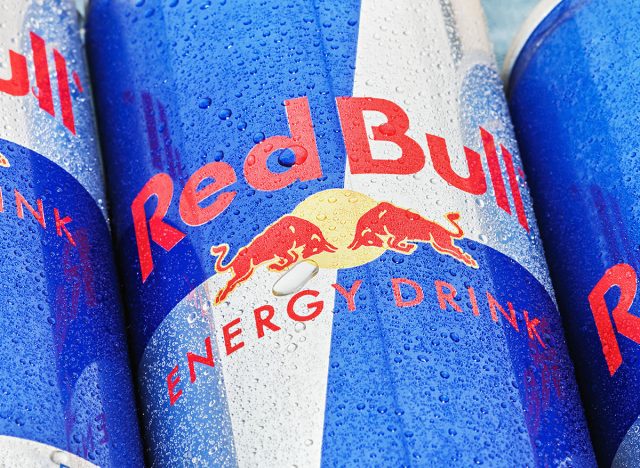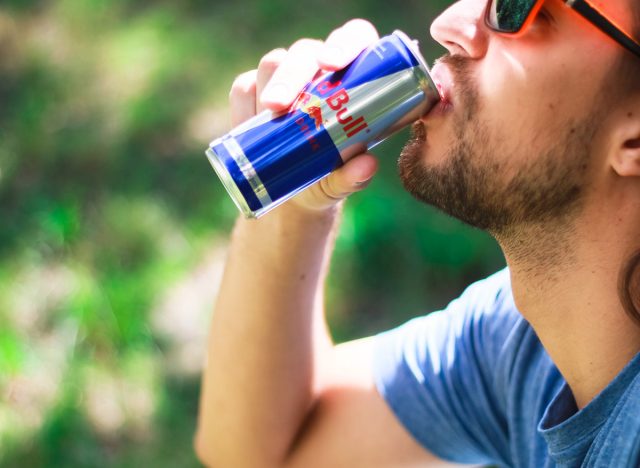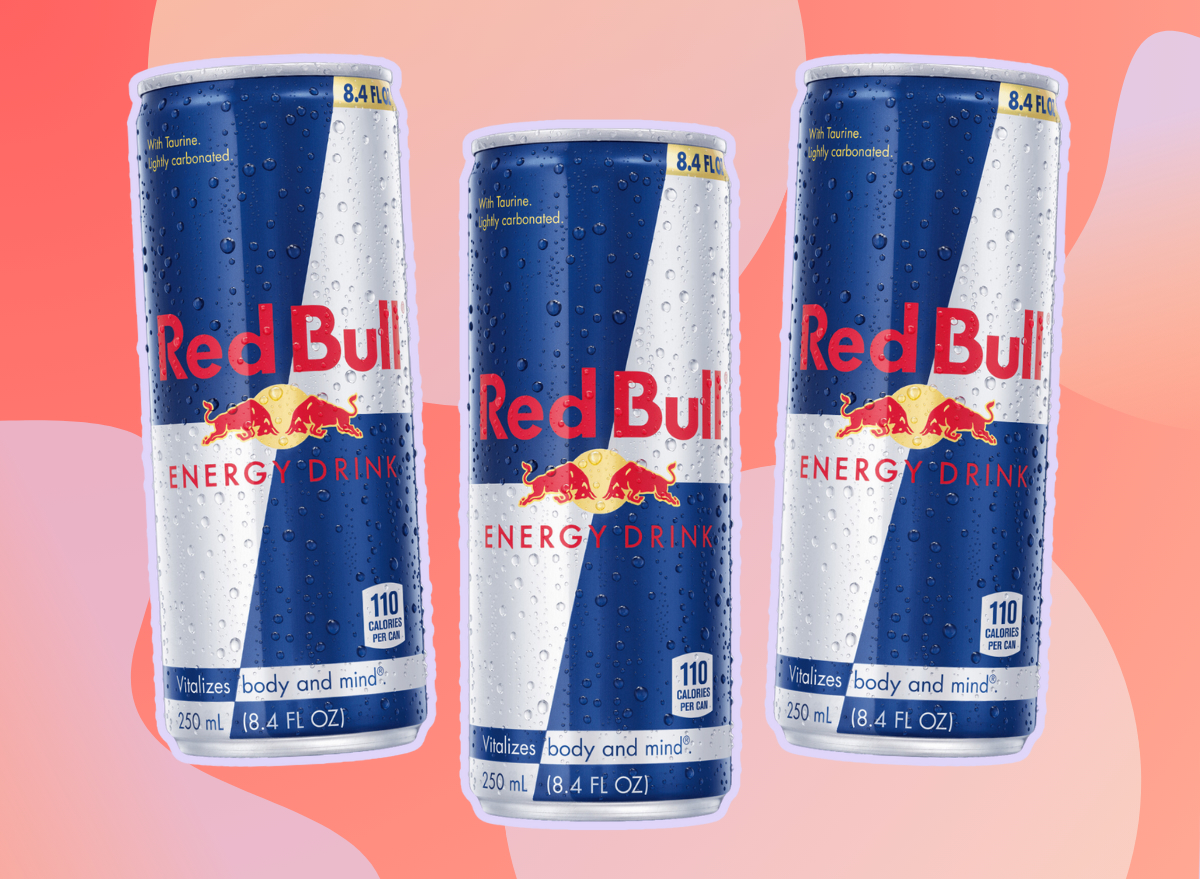Red Bull is one of the world’s most popular energy drinks, famous for its promise to boost energy levels and “give you wings.” But is that quick boost of energy actually healthy? Like many energy drinks, Red Bull raises concerns about potential health side effects. So, is Red Bull good for you, or are there hidden risks behind that energy surge?
We’ve reviewed Red Bull’s ingredients, nutritional profile, potential health benefits, and drawbacks, providing dietitian-approved insights to help you make an informed decision. Read on to learn more, and next, don’t miss 10 Natural Ways To Boost Your Energy All Day Long.
What Ingredients Are In Red Bull?

Red Bull contains several ingredients designed to boost energy, enhance focus, and improve performance. Some of its key ingredients include:
- Caffeine: The main stimulant in Red Bull, which is known to improve alertness and reduce fatigue.
- Taurine: An amino acid that plays a role in several bodily functions, including heart health and athletic performance.
- B vitamins: These vitamins (B3, B5, B6, and B12) help the body convert food into energy, supporting overall metabolism.
- Sugar: These simple carbohydrates provide an immediate source of energy.
- Carbonated water: Adds the familiar fizz and acts as a base for the drink.
- Citric Acid: Adds tartness and acts as a preservative.
Nutritional Profile of Red Bull
Here’s a look at the standard nutritional content of an 8.4 fluid ounce can of Red Bull.
Nutrition (Per 8.4 fl. oz can):
Calories: 110
Fat: 0 g (Saturated Fat: 0 g)
Sodium: 105 mg
Carbs: 29 g (Fiber: 0 g, Sugar: 27 g)
Protein: 0 g
In addition to the main nutrition label, Red Bull contains notable vitamins and minerals:
Niacin (B3): 140% of the daily recommended intake (DRI)
Pantothenic Acid (B5): 50% DRI
Vitamin B6: 360% DRI
Vitamin B12: 120% DRI
Health Benefits of Red Bull

May Provide Energy Boost
One of the main reasons people reach for Red Bull is for its quick energy boost. Thanks to its caffeine content, Red Bull acts as a stimulant for the central nervous system, helping you feel more alert and focused. Each 8.4-ounce can contains 80 milligrams of caffeine—slightly less than a cup of coffee but enough to reduce fatigue for a few hours. This makes it a popular choice for long workdays or late-night study sessions when you need to stay sharp.
May Improve Athletic Performance
The combination of caffeine and taurine in Red Bull may enhance both mental and physical performance. Caffeine is known to improve endurance and reduce perceived exertion during physical activity, making it a go-to for athletes. Meanwhile, taurine—an amino acid found in Red Bull—may support muscle function and heart health. As a pre-workout drink, Red Bull may increase focus and reduce fatigue, helping athletes train longer and harder. The combination of these ingredients can also improve reaction times and mental clarity, offering benefits for both body and mind during high-intensity activities.
May Help with Vitamin Supplementation
Red Bull contains several B vitamins, including B3, B5, B6, and B12, which all play a crucial role in the body’s energy levels and metabolism. These vitamins help convert carbohydrates, fats, and proteins into usable energy, making Red Bull a convenient option for people who may have gaps in their diet for these vitamins. B vitamins also support brain function, nerve health, and red blood cell production. While the energy boost mainly comes from caffeine and sugar, the presence of B vitamins can be an additional benefit—especially for those who may lack these nutrients in their regular diet. However, it’s crucial not to rely solely on energy drinks for nutrition; balanced meals are essential for overall health.
Potential Drawbacks of Red Bull

Contains High Sugar Content
One can of Red Bull contains 27 grams of sugar, which is more than the daily recommended limit for most adults. Regular consumption of sugary drinks can lead to weight gain, insulin resistance, and an increased risk of type 2 diabetes.
While the sugar content might offer a quick energy spike for athletes or those needing fuel for intense workouts, it can also lead to a rapid crash afterward. Be sure you’re fueling optimally with food outside of just relying on energy drinks for energy. If you’re not using this energy drink as an athlete or as fuel for an intense workout, consider choosing the sugar free option or cutting back altogether.
May Lead to Excessive Caffeine Intake
While caffeine is the main driver of Red Bull’s energy-boosting effects, consuming too much caffeine can have negative side effects. With 80 milligrams of caffeine per can, Red Bull can contribute to symptoms like jitteriness, restlessness, and increased anxiety, especially if consumed in large amounts or by those sensitive to caffeine. Too much caffeine can also disrupt sleep patterns, causing insomnia or poor sleep quality. To avoid consuming more than the recommended 400 milligrams of caffeine per day, monitor your total intake from all sources.
Potential for Heart Health Issues
There are growing concerns that energy drinks like Red Bull may have adverse effects on heart health, particularly for individuals with pre-existing cardiovascular conditions. Some studies suggest that energy drinks can increase heart rate and blood pressure due to their high caffeine and sugar content. This could raise the risk of heart palpitations, arrhythmias, or other heart-related issues, especially when consumed in large amounts or combined with other stimulants. If you have high blood pressure, heart disease, or are prone to cardiovascular problems, it’s best to avoid energy drinks or consult a healthcare provider before consuming them.
Contains Empty Calories
Red Bull may provide a quick energy boost, but its nutritional value is minimal beyond its sugar and caffeine content. At 110 calories per can, most of which come from simple sugars, Red Bull is considered a source of “empty calories.” These calories provide energy without essential nutrients like protein, fiber, or healthy fats that support overall health and satiety. Consuming empty calories regularly can lead to weight gain and potential nutrient deficiencies if not balanced with a diet rich in whole foods.
May Interfere with Sleep
Red Bull’s caffeine content can interfere with sleep, especially when consumed later in the day. With a half-life of 5-6 hours, caffeine remains in your system long after consumption, so drinking a can with 80 milligrams of caffeine may disrupt your ability to fall asleep and maintain restful sleep depending on what time of day you have your energy drink. For those sensitive to caffeine’s effects, this can mean signs of insomnia, restless sleep, and long-term sleep disruption, which may negatively affect overall health and might defeat the purpose of reaching for an energy boost in the moment.
Final Thoughts: Is Red Bull Bad For You?

Red Bull can be both beneficial and potentially bad for you, depending on how it’s consumed. While it provides a quick energy boost and improved mental focus, its high sugar and caffeine content can contribute to negative health effects if consumed regularly or in large amounts. For those sensitive to caffeine or looking to reduce sugar intake, Red Bull may not be the best choice.
Looking for healthier alternatives to Red Bull? Consider low-sugar energy drinks such as Zevia Energy, which uses natural sweeteners, or V8 +Energy, which is made from fruits and vegetables with a lower caffeine content. These drinks can provide a more balanced energy boost without the risks associated with excessive sugar and caffeine.









